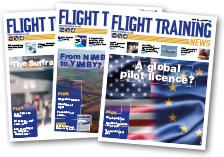Dr Andy Taylor has told FTN that following the strong interest in his research into the relevance and effectiveness of the current ATPL theoretical knowledge examinations, airlines, training organisations, instructors and trainees have offered their support to his work.
Dr Taylor told FTN: “Following the success of my conference presentation at the Royal Aeronautical Society in September, and the positive interest it generated from pilots, instructors and trainee pilots, I was thrilled to be able to launch my extended research project at EATS in Berlin.”
The aim is to test the hypothesis that the current theoretical knowledge subjects and exams are not fit for purpose. The main objective of the project is to present properly formatted ATPL exam papers for all 14 subjects to pilots, followed by a questionnaire.
The targeted sample size is 1400 pilots (100 for each exam), but interest and offers of assistance have already been received from airlines, ATOs and pilots, both in terms of achieving that target and for help with other aspects of the project, including compilation of the exam papers, but additional assistance will still be needed.
“It should be noted that the exam participants will not be asked for any personal details, other than their rank and length of operational service, and any airline, ATO or other parties involved will also have the option to remain completely anonymous,” says Dr Taylor adding. “Anyone who thinks they may be able to help, or would like further information can contact me via email at: [email protected].”
It is hoped that this project will ultimately result in a much more focussed, relevant and pedagogical theoretical syllabus, which will serve to benefit the industry as a whole through:
• Pilots with greater understanding of the subjects that are relevant and useful in their day-to-day operations;
• A refined, less costly theoretical knowledge training process;
• An enhanced image of the ATPL ground school to ‘sell’ pilot training and pilot careers in a more positive light;
• Less stressed trainees, who enjoy the learning process and feel greater learning fulfilment;
• Increased retention of trainees at ground school level, improved average marks and fewer cases of fail/resit.







